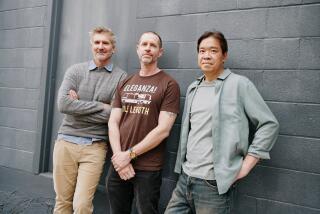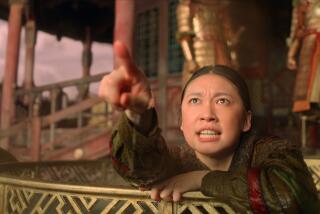Man’s ‘Death Diary’ Touches a Nerve in China
- Share via
SHANGHAI — “Tuesdays With Morrie” was a hit book here in China. Now there is “Death Diary,” by a Shanghai cancer patient who has morphed into this nation’s own Morrie Schwartz.
In fact, Lu Youqing may touch Chinese hearts even more than did the terminally ill retired professor chronicled in the U.S. bestseller. Lu is only 37. And he has been able to reach out to 2 million of his countrymen through cyberspace.
Now a book version of Lu’s Web site essays is due out this month--a parting gift to his wife and 10-year-old daughter.
The former real estate developer’s family did not expect him to become a household name. The essays were only supposed to help Lu through the doldrums of disease. But somehow his direct and often humorous musing about life touched a nerve in a wide audience, especially young people who grew up in a material world devoid of spirituality and honest conversations about death.
“We chose to go to a banquet instead of take our child to the museum,” he wrote in one online entry, “because we think the meal is more important, not because someone forced us to eat lobsters. But think about it. Few deals are made in a restaurant. An exhibit might change a child’s life.”
“I feel like a piece of laundry in a washing machine; someone threw me out before the cycle is done,” he wrote in another entry.
What makes Lu’s fate particularly compelling is that his life epitomizes the ultimate success story of his generation. He grew up during China’s destructive 1966-76 Cultural Revolution but was not old enough to be ruined by it. He glided through college and trained himself as a businessman during the heyday of China’s special economic zones. He returned to Shanghai as an entrepreneur in the hot field of advertising and switched to real estate at the peak of the market.
He seemed to have it all, including a fancy apartment and his own car, putting his standard of living well above that of an average Chinese.
Then six years ago Lu found out he had stomach cancer. Five years later a malignant tumor was found on his neck. Over the summer, doctors told him he had 100 days to live.
After Chemo, Patient Turns to Writing
To many people’s surprise, the super-yuppie’s reaction was not to throw money at endless high-tech treatments. After two operations and chemotherapy, he turned to writing, a dream never realized during the frenzy of his professional life. On his daughter’s birthday in August, Lu logged in his first entry to https://www.rongshu.com, a popular literary Web site based here in Shanghai. His final entry in October marked his own birthday.
“The Internet gave us confidence, courage and inspiration,” Shi Muyan, Lu’s wife and college sweetheart, said recently at a Shanghai hospital. Her husband is already too ill to speak clearly or move about; his face is swollen from the disease.
Since Lu signed off last month, his wife has been logging on in his place, reading e-mail to him and posting updates on his condition.
“I go online every night, no matter how late or how tired I am,” said the former teacher, who quit her job to take care of her husband.
According to Shi, her husband had not heard of “Tuesdays With Morrie” when he started his project but was introduced to it late in his illness. The 1997 book by Mitch Albom, which tells the true story of the author’s weekly discussions with his dying former professor, is the only book Lu has ever started reading but not finished, Shi said.
Lu’s mind remains alert, however. He designed the jacket and inside layout of his forthcoming book, which has a running calendar on each page marking the countdown to the end. To avoid piracy, he made sure only half of what he has written appeared online. The rest is saved for his memoir. The proceeds will go to his wife and daughter.
“I am only an ordinary person. I hope more people would face life with happiness,” Lu said in a coarse whisper as he thanked his publishers for rushing advanced copies of the book to his hospital bed so he could sign them for his family.
The first printing will be 70,000 copies. That may seem puny compared with Albom’s book, which has at least 5 million copies in print worldwide. But Lu’s book is already considered a potential hot seller in the current Chinese market, said Li Bo, his Beijing publisher. Long gone are the days when hundreds of millions of people read the same book of quotations written by Communist Party Chairman Mao Tse-tung. The market is now fragmented. There are few explosive talents and many distractions in a multimedia consumer culture.
“Chinese literature is in a mess right now,” said William Zhu, a 29-year-old Shanghai native who grew up in Mission Viejo. He is CEO and founder of rongshu.com (rongshu means banyan tree), a place for Chinese-speaking wannabe authors around the world to share their works. “We don’t know where the next piece of great literature is going to come from.”
So far, Zhu said, no other author has received as many hits on the Web site as has Lu, peaking at about 120,000 a day. The added traffic nearly crashed the system.
Before “Death Diary” seduced the finicky Chinese audience, there were flashes of interest in the self-anointed “bad girl” literature. Wei Hui penned “Shanghai Baby” and Mian Mian wrote “Candy,” emotionally detached semiautobiographical tales of sex, drugs and rock ‘n’ roll.
Then there is exiled author Gao Xingjian, who won the Nobel Prize in literature last month. Despite the award, there is a media blackout in China on news about the Paris resident and his work. Beijing oligarchs consider him subversive.
In an environment filled with choice as well as censorship, Lu’s “Death Diary” seems like a safer and more sincere alternative. There are skeptics who question his motives for airing his personal drama and blame him for giving up treatment before exhausting all his options. But in general, he is seen as an endearing prototype in a country facing deep generational divides.
While the 60-year-old Gao represents a generation that is consumed by painful memories of Communist China’s turbulent past, those in their 20s can’t relate to their parents’ suffering and see little meaning or direction in the current rat race. Lu has caught the upsides of China’s radical mood swings, appealing to both young and old.
“They are the most precious generation,” said Zhu of Chinese in their 30s. “They can look back and understand China’s past and look forward and see its future.”
That also makes Lu a great teacher for the here and now.
“Enjoyment of springtime shouldn’t be based on the weather report on our beepers,” Lu wrote in a September entry after sorting through his old appointment calendars. “Communication with our parents shouldn’t be limited to the naggings on the telephone. Kisses to our children shouldn’t feel like a chop on a postage stamp. Tenderness to our spouses shouldn’t be reserved for the end of a shopping spree.”
‘He Taught Us About Family, Community’
Wang Qiming said he and his college buddies initially clicked onto Lu’s Web entries looking for a blow-by-blow account of death, something that is generally reserved, in Chinese culture, for discussions of Communist martyrs or felons. But it’s the lessons on life that got them hooked.
“We are single children raised on a lot of loneliness. He taught us about family and community,” said the 21-year-old Wang. “And I liked how he said 70% of all the books he’s read [are] useless. I totally agree.”
Others found the ailing man’s life enviable.
“Lu’s generation grew up during much more interesting times,” said Zhu Min, 23. “People my age have boring lives that are pretty much all the same. Make money and feel lost. When we get old, I don’t know if we’ll have anything worth writing about.”
More to Read
Sign up for our Book Club newsletter
Get the latest news, events and more from the Los Angeles Times Book Club, and help us get L.A. reading and talking.
You may occasionally receive promotional content from the Los Angeles Times.







